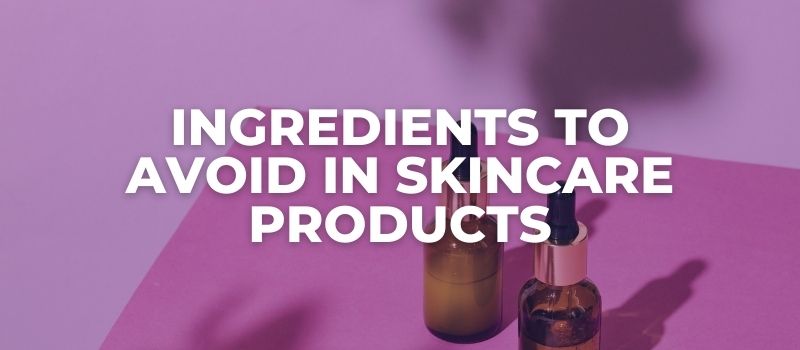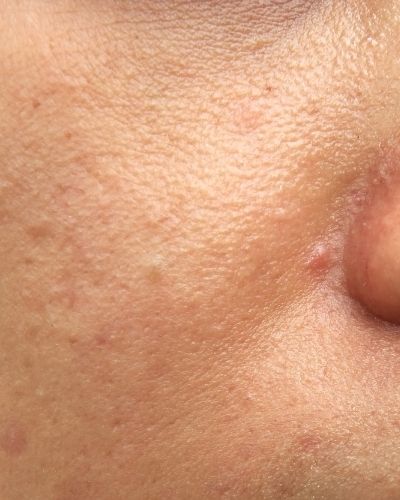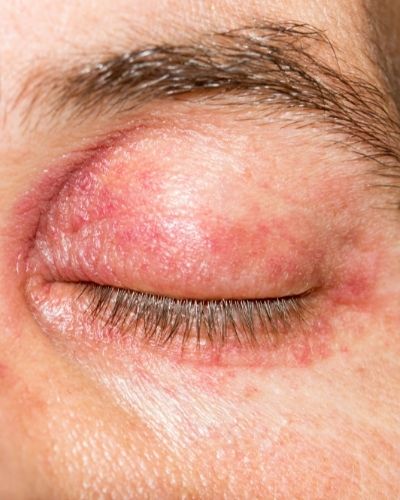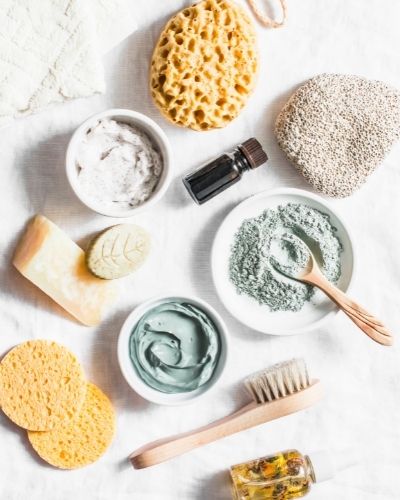Ingredients are the most important thing you should pay attention to when choosing skincare products.
This is because some ingredients can improve your skin’s condition while others can exacerbate your skin concerns.
However, ingredients are challenging to understand, mainly because there is so much confusion that stems from individual bias.
Some people say there’s nothing wrong with a particular ingredient, while others blame the same ingredient for causing all their skin ailments.
So who are you supposed to trust?
Well, you can’t trust anybody simply because everyone’s skin will react differently to various components found in products.
And while this may be a little confusing, there are a few known ingredients that can potentially be problematic for some skin types and concerns.
In this article, I will give you a list of ingredients to avoid in skincare products based on your skin type, the condition of your skin, and the skin concerns you want to target.
So let’s start with the first category of ingredients to avoid in skincare products:

Drying Ingredients

Drying ingredients in skincare products are never a good idea, no matter your skin type or skin condition.
If you have normal to dry skin, these ingredients can, over time, dry it out even more and compromise your skin barrier’s function.
The same can happen to oily skin, although it can take much longer since oily skin is typically coarser and more resilient than normal to dry skin.
And once your skin’s barrier is damaged, this will allow for easy moisture evaporation, excess dryness and discomfort, cracked skin (especially around the mouth), and severe irritation.
Here are two drying ingredients most commonly found in skincare products:
Alcohol
Alcohols serve an important function in skincare products. They are typically used to create a more elegant formula, help other ingredients penetrate the skin better, and even serve as preservatives to prevent bacteria overgrowth in the product their antibacterial properties.
However, certain types of alcohols such as isopropyl and benzyl alcohol can not only be incredibly drying to the skin but can also create a free-radical frenzy that can result in cell death.
Another type of alcohol that’s most commonly found in skincare products is Ethanol (or ethyl alcohol, alcohol denat., SD alcohol), and this one is used as a solvent to give a lightweight feel to the formula.
It is most commonly found in sunscreens, especially those that are super runny and lightweight, such as the ultra-popular La Roche-Posay Ultra-Light Invisible Fluid SPF 30.
This alcohol isn’t all that bad, and while you should avoid buying cleansers and serums with it, it’s totally fine in moisturizers, sunscreens, and targeted treatments (such as acne products) that you use a few times a week.
Astringents
Astringents are ingredients that have a drying and tightening effect on the skin. They work by drying out the protective oil on the skin’s surface and in the pores to make them appear tighter, cleaner, and smaller.
In the past, they were considered an effective treatment for oily and acne-prone skin until we, fortunately, came up with something better and moved away from using them.
Today’s most popular astringent found in skincare products is witch hazel, a component derived from a plant that grows wild throughout North America and Asia.
It is known by its Latin name Hamamelis Virginiana, and this is the name that you will most likely see written on the ingredient list of skincare products that contain witch hazel.
Witch hazel can be found in anything from cleansers, serums, and moisturizers, but it is most commonly spotted in toner-like liquids.
It can be incredibly dehydrating to the skin and can, over time, weaken its moisture barrier and lead to irritations and discomfort.
Clogging Ingredients

Clogging ingredients are components that can create an oily film on the surface of your skin and prevent the natural oil from coming out of the pore.
This means that the oil will remain inside and form a plug that will prevent the new oil secreted by the sebaceous glands from coming out, and this will continue until the immune system kicks in and a pimple is formed.
The most complicated thing about clogging ingredients is that you never know how your skin will react to them.
Generally, people with dry skin rarely have problems with these ingredients. In fact, their skin benefits from the oily film created on the surface because it helps keep it lubricated and comfortable.
People with oily skin, on the other hand, are more frequently those who have an issue with these ingredients since they already have excess oil, and anything extra could cause issues such as acne and inflammation to occur.
So, even though you need to figure out what’s causing you an issue by yourself because it’s a very individual thing, there are a few known clogging ingredients you should watch out for, especially if you have oily and acne-prone skin.
Here are some of them:
Oils
Whether they are pure or specially formulated inside skincare products – oils are a problem for oily and *especially* acne-prone skin.
These components can soften the skin from the outside, but realistically they don’t have any hydrating properties because they have enormous molecules incapable of penetrating the outermost layer of the epidermis to hydrate the skin.
Oils stay on the surface of the skin and create a film that lubricates it and prevents discomfort from excessive dryness.
This is why they may be suitable for dry skin, but stay away from them if you are oily and acne-prone. Here are a few particularly clogging oils often found in skincare products:
- Almond oil
- Argan oil (Argania Spinosa)
- Avocado oil
- Chia seed oil (Salvia Hispanica)
- Coconut oil (Cocos Nucifera)
- Flaxseed oil (linseed oil)
- Jojoba oil/Jojoba seed oil/ Jojoba esters (Simmondsia Chinensis)
- Macadamia nut oil
- Marula oil (Sclerocarya Birrea)
- Moringa oil
- Olive oil (Olea Europaea)
- Palm oil
- Primrose oil (Oenothera Bienis)
- Rosehip oil (Rosa Canina/Rosa Rubiginosa)
- Tamanu oil
- Tocopherol (vitamin E oil)
Emollients
Emollients are often found in those thick and creamy moisturizers suitable for dry skin (think La-La Retro Whipped Cream by Drunk Elephant).
However, much like oils, some emollients can be exceptionally problematic for oily and acne-prone skin.
Some emollients can be problematic for oily and acne-prone skin even if they are found in acne medication such as tretinoin.
For example, there are gel-based and cream-based tretinoin. While both are excellent acne medication, some ingredients such as the emollient Isopropyl Myristate that’s found in cream-based tretinoin can be the sole cause for clogging and breaking out for some skins, even while using the treatment.
So, do your best to stay away from the following comedogenic emollients:
- Caprylic/Capric triglycerides
- Cocoa butter
- Coconut butter
- Isopropyl isostearate (highly comedogenic)
- Isopropyl lanolate
- Isopropyl linoleate
- Isopropyl myristate (highly comedogenic)
- Isopropyl neopentanoate
- Isopropyl palmitate
- Isopropyl stearate (highly comedogenic)
- Isostearic acid
- Isostearyl alcohol
- Isostearyl isostearate
- Isostearyl neopentanoate
Irritating Ingredients

First things first – anything can be irritating for some skins because it’s not about the component itself but how your skin reacts to it.
Some people get irritations from niacinamide, which is one of the safest ingredients found in skincare products, and it even helps repair the moisture barrier.
However, with that said, there are known irritants that are more likely to cause an issue compared to other ingredients, and these are the ones you should know about and try to avoid them the best you can.
It doesn’t mean they will absolutely cause you an issue, but they might, so it’s best to know them and avoid them. Here are a few known irritants found in skincare products:
Fragrance/Parfum
Fragrance/perfume is obviously the component that gives the product a nice and pleasant smell.
The thing is, some raw ingredients smell terrible, so manufacturers have to add a nice smell; otherwise, nobody would buy the product no matter how effective it is.
That’s cool, but what you see as “Fragrance” on the ingredient list can actually be over 50 fragrant components mixed in one and listed as “fragrance” or “perfume.”
Now consider that even one of these components can be problematic for some people, but over 50 is definitely increasing the chances of irritation.
And the worst part about it is that you can develop intolerance or allergy to perfumes at any point in your life.
And once you develop an allergy or intolerance to perfume, this could cause a ton of issues down the line, including swelling, headaches, rashes, and other, more permanent inconveniences such as contact dermatitis.
The thing is, fragrance doesn’t have any beneficial properties inside a skincare product.
It’s just there to make it smell nice and sell better. But because it can potentially cause all these issues, it is best to avoid it where you can.
Essential oils
Essential oils are often used as the “natural alternative” to fragrance in skincare products, but they can also irritate the skin.
As I already mentioned above, raw ingredients can have a horrible smell, so a nicer and more pleasant scent is added to mask it.
For example, raw ascorbic acid (vitamin C) stinks like wet socks, so a citrusy scent is often added to vitamin C products to make the consumer associate the product with a nice-smelling lemon or orange tree instead of something made inside a lab.
And this is where essential oils are added. Citrus oils have a pleasant scent and don’t smell overpowering, so it’s the perfect addition.
But much like fragrances, they can also be sensitizing to the skin, and you should try to avoid them where you can. Some essential oils frequently found in skincare products are:
- Tea tree oil
- Orange peel oil
- Lemongrass oil
- Sage oil
- Eucalyptus oil
- Sandalwood
Chemical UV filters
In basic terms, there are two types of sunscreens: chemical and mineral.
Mineral sunscreens use zinc oxide and titanium dioxide to protect the skin from the sun; however, they tend to be heavier on the skin and leave a white cast.
Chemical sunscreens use chemical filters to protect the skin against UV damage. They typically penetrate the skin’s surface and act as an invisible sponge, absorbing UVA and UVB rays as they come into contact with the skin.
The most commonly used chemical UV filters are:
- Octocrylene
- Avobenzone
- Oxybenzone
- Homosalate
Triazines and Triazones are also another popular group of chemical filters that are used in European sunscreens.
However, chemical sunscreens can sometimes cause irritations for people with very sensitive skin or someone who has just done a cosmetic procedure such as a chemical peel or laser.
Chemical sunscreens are safe to use, but if your skin is having troubles getting used to them, it’s best to stick to mineral sunscreens.
Abrasive Components

Products containing abrasive components such as scrubs with nut kernels, coffee grounds, rice, and even some powders can cause an issue for the skin.
Some research suggests some abrasive components such as walnut kernels can potentially cause microtears in the skin in the long run; however, this also depends on how harshly you rub them onto the skin, how big the kernels are, how often do you use them, etc.
However, what they can most certainly do in the short term is cause irritation and inflammation to the skin, especially if your skin is already prone to sensitivity and redness.
They can also be very problematic if used on acne as they can actually cause the bump to erupt and spread cellular debris such as dead skin cells and bacteria in the surrounding areas.
So try to avoid using anything that contains abrasive components, especially if your skin is already compromised.

My name is Simone and I am a certified skin specialist. I created this website to teach my readers how to take great care of their skin and I also like to occasionally share my honest opinions on skincare products I’ve tried. You can learn more about me here.

Please which oils are actually good for acne prone skin. Thank you
Hi Nikky!
I don’t think oils are good for acne-prone skin. It’s best to choose a hydrating moisturizer and focus on exfoliation, instead of oils.
Best,
Simone